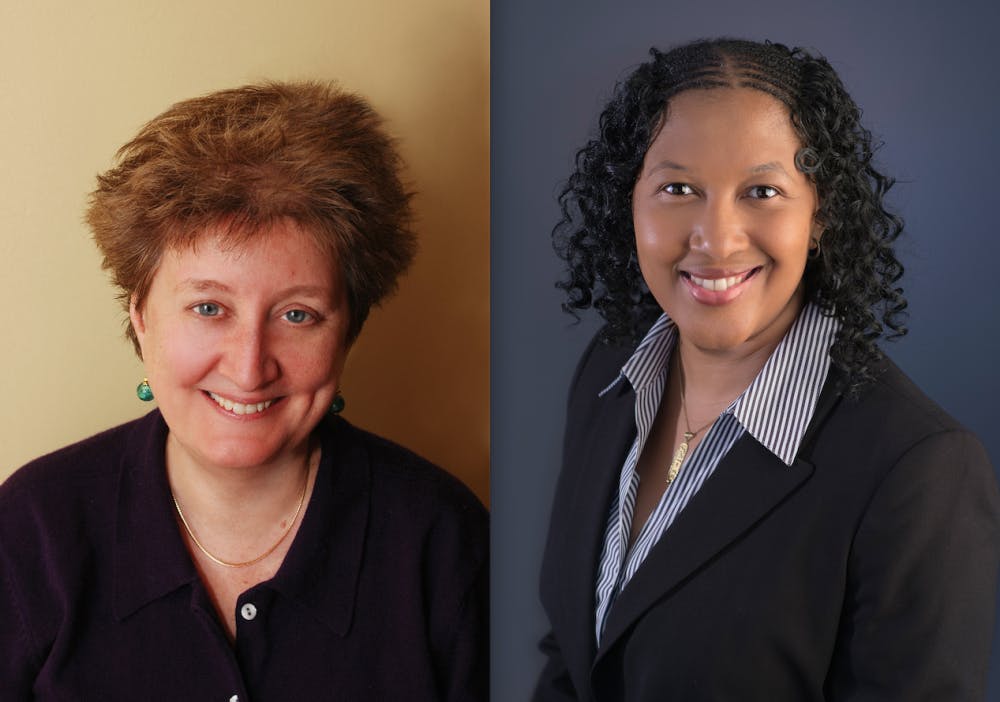Students and faculty gathered to listen to the dialogue between Katha Pollitt and Janell Hobson in an event titled “What Can Feminism Speak To?” in Wilson Hall on Wednesday, Sept. 27. The lecture presented the topic of intersectional feminism and the realm of womanhood throughout all aspects of life.
The event, which included a lunch with Pollitt and several students the following day, was sponsored by the president’s office, the feminist studies department and the Chellis House.
Pollitt is a feminist critic and writer of the column “Subject to Debate” for The Nation. Hobson is an associate professor of sexuality at the University of Albany, State University of New York. The talk was hosted and moderated by Middlebury professor Laurie Essig. Throughout the talk, the women touched on intersectional feminism, the 2016 election and feminist celebrities.
Pollitt began the dialogue talking about how essentially everything affects women because women exist in every sphere of life. She mentioned that when she asked women what their preoccupations were, they gave answers such as race, health care, cyber security, Silicon Valley, LGBTQ rights, trans issues and reproductive justice.
On reproductive justice specifically, Pollitt stressed that choice is important, but not enough. She said that women need resources in order to raise children, and that therefore reproductive rights extend beyond pregnancy into motherhood.
“This aspect is not mentioned enough,” Pollitt said, adding that class is often a factor. “Choice is hampered if a woman is poor.” She also pointed out the inherent imbalance in who is responsible for family planning. “Why is it women’s jobs to fix everything?” she said. “I’m still waiting for that big march where men march for birth control for men.”
Hobson agreed with Pollitt that most aspects of life have a gender component. However, she added that feminism should speak to the most marginalized, not just the mainstream. Feminism has traditionally focused on white, middle-class, straight women, making it an exclusive, and therefore hypocritical, advocacy for equality. Hobson added that this focus on white women has created a false competition between white women and men of color, which leaves women of color entirely out of the picture.
“If we start with women at the bottom, think of how all other women are implicated,” Hobson said. “When black women get free, every woman gets free.”
Hobson also talked about women and sexism in politics, touching on the fact that Huma Abedin, vice chair of Clinton’s 2016 campaign, blamed herself for Clinton’s loss because of a sexting scandal involving her now ex-husband, Anthony Wiener. Hobson related this incident to the public’s reaction to the Bill Clinton scandal, for which Hillary was criticized throughout her campaign, and for which Hillary is often still blamed.
Pollitt also expressed the importance of supporting Hillary in the election’s aftermath while the public, including President Trump, continues to attack her.
“I don’t even look at the question ‘if Hillary were a man would she have won?’” Pollitt said. Instead, she says she asks, “If Trump were a woman would he have won? If Trump were a black man would he have gotten anywhere? If Trump were anything but a white man?”
This liberal sentiment won cheers and applause from the audience. But one student, who identified as a woman and a Democrat, expressed a concern that Republican women were excluded from feminism in the current political climate that labels Trump supporters as sexist and misogynist.
“You have to be able to overlook a lot of what Donald Trump said about women in order to vote for him,” Pollitt said in response.
Commenting on the 53 percent of white women voters who voted for Trump, Hobson also discussed the distrust many women of color had of Hillary. “I need to think of what it means to distrust the white woman,” she said. “When we talk about power and privilege, we don’t expect Trump to support [women of color], but we don’t expect white women to, either.”
The two speakers also addressed pornography, sexism related to technology and celebrity feminism, speaking briefly of celebrities who shun feminism and those who embrace it. Hobson discussed Beyoncé, about whom she wrote a cover story about for Ms. Magazine in 2013. Hobson described her impression of Beyoncé’s feminism to be an evolution.
“When I wrote that piece, I was still unclear about how feminist she was,” she said. “But I didn’t have to defend her because six months later she released flawless.”
Students who attended to talk enjoyed the different perspectives on stage. “I liked that, despite their differing viewpoints on some issues, Janell and Katha were able to agree on the key ideals of feminism and why it’s so necessary,” said Taite Shomo ’20.5, who attended both the talk and lunch. “I think that it’s important given the current political climate to be talking about feminism and especially intersectional feminism, and that Janell Hobson’s point about helping out the most marginalized people really spoke to that.”
President Laurie L. Patton made a similar point in a school-wide email sent before the event.
“Katha Pollitt and Janell Hobson are leading feminist voices of their generations, but also write from different points of view,” Patton wrote.
The Office of the President will be sponsoring more critical conversations throughout the year in the hope of opening up discussion to various academic perspectives.



